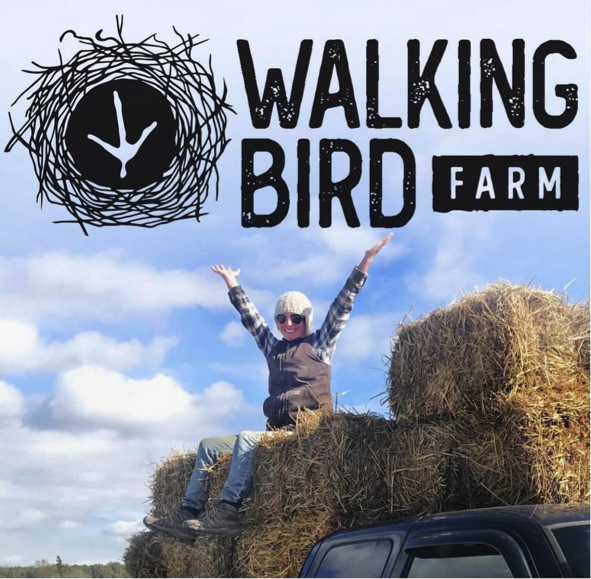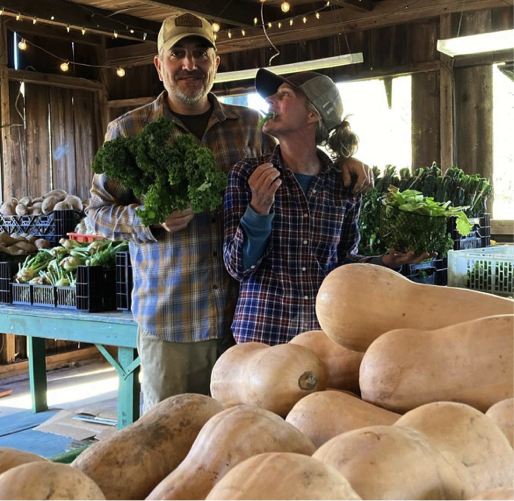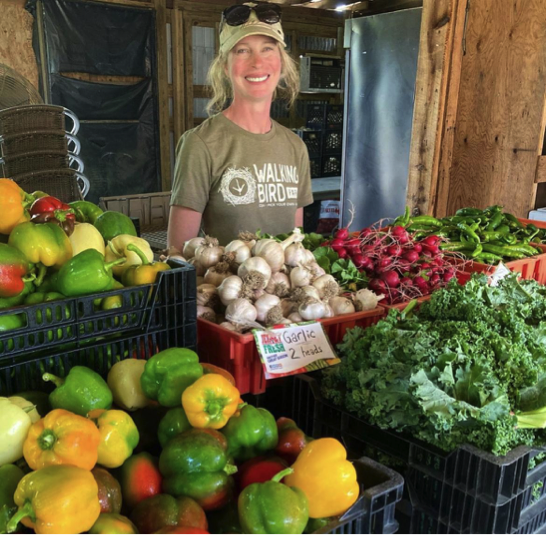
Photo credit: Walking Bird Farm
Over the past few years, Walking Bird Farm has worked to connect community members, customers, and local businesses through its Community-Supported Agriculture program and on-farm events. The farm makes it a point to sell fresh, high-quality, and sustainably grown produce.
Walking Bird Farm, formerly known as B&B Farms, is located in Egg Harbor City, NJ. The farm is located a mere 15 miles and 24 minutes from downtown Atlantic City. The farm was purchased in 2020 by the previous owners’ nephew, Ryan LaMonaca, and his wife, Stockton University graduate and former marine scientist, Jennifer LaMonaca. Since then, the LaMonacas and their team of farmers have successfully built the CSA program, connected with the surrounding community, and implemented sustainable practices in their work.

Jennifer and Ryan LaMonaca. Photo credit: Walking Bird Farm
“We are a working farm and what we do for a living is grow food for the community,” said Jennifer LaMonaca, describing the farm’s mission. “We have a lot of beginner farmers that work with us that come to work here because they want to learn how to farm and they run their own farms. They want to know that they can do this for a living, but if people don’t support us, then this farm will not survive.”
Sustainable farming practices
Walking Bird Farm implements a range of sustainable growing practices, including eco-friendly pest management, fertilization, composting, and alternative methods of weed control.
One example is Integrated Pest Management, described by the US Department of Agriculture as a decision-making process based on science that allows you to effectively manage and minimize pests without killing all of them off. At Walking Bird Farm, the team members implement IPM by using organic fungicides and pesticides, they only spray when necessary, and they rotate the sprays that are used.
“We’re treating just the pest. We’re not treating the plant; instead, we’re targeting a particular insect. There are a lot of conventional sprays that you can use to hit the plant and whatever eats the plant dies, but we don’t want to do that. It’s better for our customers, it’s better for the environment,” said Jennifer LaMonaca.
The farm also practices cover cropping, which is the practice of planting crops for a variety of purposes such as adding nitrogen or carbon to the soil, reducing erosion, controlling weeds, and aerating the soil.
“At the end of the season, and sometimes even during the summer, we could squeeze in some cover crops that will provide additional nitrogen so we don’t have to use so much fertilizer. If we can get the nitrogen and other nutrients from our cover crops, that’s the direction we move in,” said LaMonaca.
Walking Bird Farm uses a mixture of cover crop seeds including peas, clover, ryegrass, and buckwheat. The farmers plant the seeds on a field where they may not be growing other crops for a while, in hopes that the cover crops will smother the weeds. Eventually, they mow the plants and it becomes green manure. This also puts more nitrogen and other nutrients into the soil, allowing them to rely less on bagged fertilizers.

Walking Bird Farm is committed to farming sustainably and supported community. Photo credit: Walking Bird Farm
In addition to cover cropping and IPM, the farm team members try to implement sustainability wherever they can. For example, they are currently looking into moving away from plastic mulch. They also do a lot of composting.
Dealing with weeds is another big issue and instead of using weed control such as sprays, they utilize landscape fabrics to smother the weeds.
Crew manager Riley Blankenship described another aspect of Walking Bird Farm’s promotion of a sustainable future: helping to educate the next generation of farmers. In addition to being a crew manager at Walking Bird Farm, Blankenship is the coordinator of CRAFT, the Cooperative Regional Alliance for Farmer Training, which allows farmers and their peers to connect with one another, share ideas, run farm tours, and help build the future of farming. Blankenship described how Jennifer LaMonaca supports this education.
“She really values allowing the crew to go on farm tours and things like that, and really allows us to continue our education in agriculture… This is what we want to do, we want to be farmers, and it’s tricky to get started,” said Blankenship, “I think that’s a big part of the sustainability here as well, as far as getting that next generation of farmers educated because we’re going to need a lot more farmers in the future.”
Sustainability Professor Ron Hutchinson of Stockton University, a supervisor at Stockton’s sustainable farm, expressed his enthusiasm about the CRAFT organization. “CRAFT is a wonderful organization that basically trains farmers. It is a wonderful resource and a great way for farmers to exchange information,” said Hutchinson.
Finally, sustainability can be found within the namesake of the farm, “the bird”. At the beginning of each season the killdeer bird nests throughout the fields at Walking Bird Farm. The birds walk the fields trying to protect their eggs from tractors. In order to help preserve the species and allow them the chance to hatch successfully, the farm team flags the nests and protects them from harm.
Nurturing a strong community
In addition to sustainability, Walking Bird Farm focuses on connecting with and feeding the community in and around Egg Harbor City, primarily through its CSA program. The CSA program allows community members to purchase shares of crops from the farm. The customers pay in advance of the growing season, then once a week they visit the farm to pick up their shares. The shares come in small, medium, or large sizes and the customers have a choice of the summer season, fall season, or both. When receiving their weekly share, customers can choose which items they would like, which can include pick-your-own produce as well.
The CSA program benefits both the farm and the customers. It brings in a profit that supports the farm’s expenses, such as payroll, seed, and fertilizer. It allows community members to not only receive fresh food but also to see exactly where their food is coming from.
“They can see who’s growing it, where it’s growing, what we’re doing, and people working out in the field, so they’re really connected to the farm. And then they taste the differences,” said Jennifer LaMonaca, “You can get all of this beautifully grown food harvested fresh out in the field… we’re selling an experience and a value.”
Currently, the farm is taking on about 400 families per season to participate in the CSA program.
“I like the way that farming is going more local. People want to buy food that is grown locally and that is a great trend that spans across every community. It is a wonderful trend in agriculture to support your local farmer. I wish more people knew about that,” said Hutchinson.
If you are not a CSA member, there are still opportunities to check out Walking Bird Farm. The farm offers “u-pick” crops throughout the season, many of which are open to the public. Check out this section of its website or go to its Instagram, @walkingbirdfarm, to see updates about which u-pick crops are currently available.
It also hosts events, like the recent Happy Hour event in partnership with other local businesses such as Hammerbacher Bakery, Misty Meadow Sheep and Dairy, and Atlantic City-based brewery The Seed Beer. During these collaboration events, people hang out, eat, sample products from local small businesses, and possibly pick their own crops. The farm also puts on events such as barn concerts, on-farm dinners, and a fall craft show. Check out its events page or Instagram for more information.
“I really like what we’re all about, trying to produce local food for local people…We like people coming to the farm, showing them what we’re doing, and having them involved in the process,” said Blankenship, “We’re big about having a farm that people can actually come out to see and experience.”
So far, the farm has successfully fulfilled its mission through its community-based and sustainable work.
In a sign of her passion for the work that the farm does, Jennifer LaMonaca said it felt natural to switch careers. “It was an easy transition going from marine science to farming… we’re a small family farm and we’re growing food because we enjoy doing this and feeding our community.”
This story was produced in collaboration with CivicStory (www.civicstory.org) and the NJ Sustainability Reporting project (www.SRhub.org).
